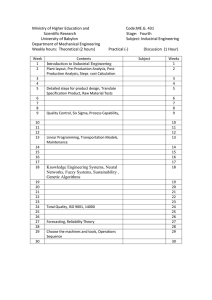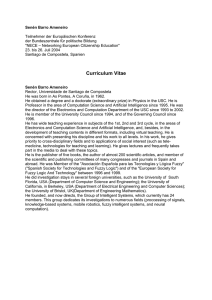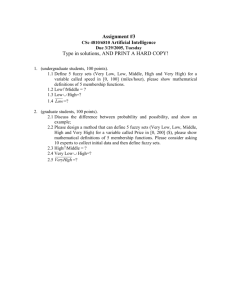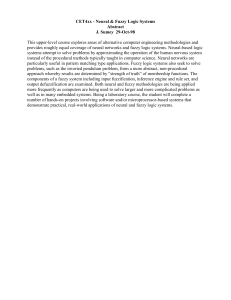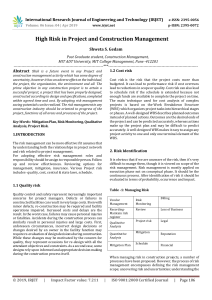Soft Computing Techniques and Applications Survey
advertisement
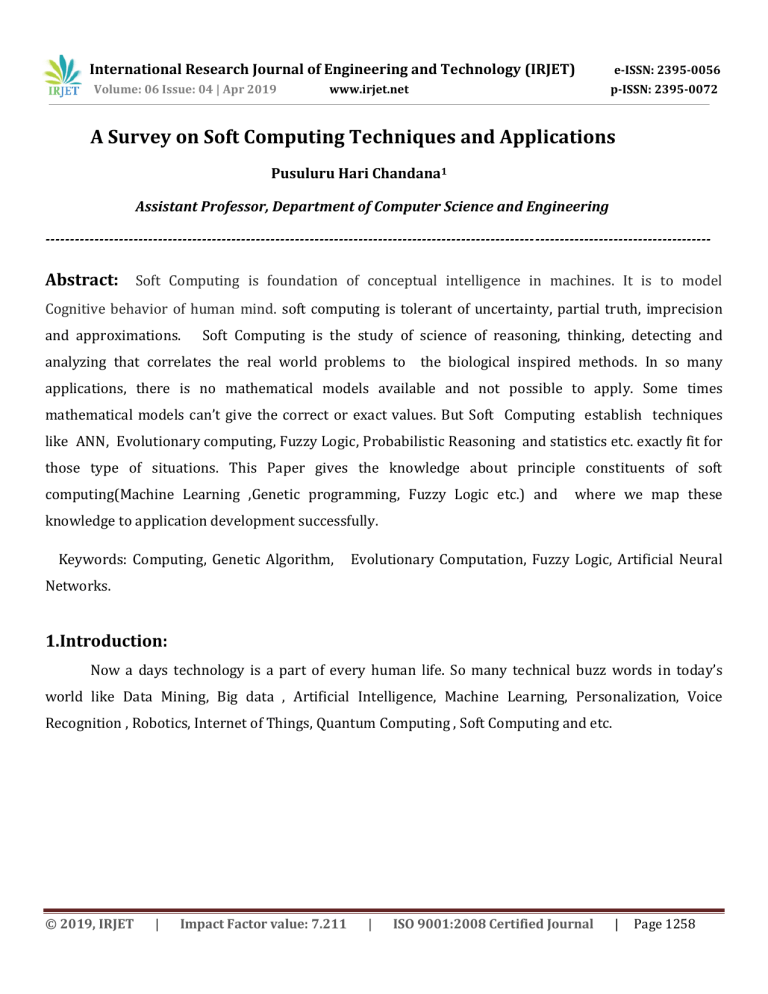
International Research Journal of Engineering and Technology (IRJET) Volume: 06 Issue: 04 | Apr 2019 www.irjet.net e-ISSN: 2395-0056 p-ISSN: 2395-0072 A Survey on Soft Computing Techniques and Applications Pusuluru Hari Chandana1 Assistant Professor, Department of Computer Science and Engineering ---------------------------------------------------------------------------------------------------------------------------------------- Abstract: Soft Computing is foundation of conceptual intelligence in machines. It is to model Cognitive behavior of human mind. soft computing is tolerant of uncertainty, partial truth, imprecision and approximations. Soft Computing is the study of science of reasoning, thinking, detecting and analyzing that correlates the real world problems to the biological inspired methods. In so many applications, there is no mathematical models available and not possible to apply. Some times mathematical models can’t give the correct or exact values. But Soft Computing establish techniques like ANN, Evolutionary computing, Fuzzy Logic, Probabilistic Reasoning and statistics etc. exactly fit for those type of situations. This Paper gives the knowledge about principle constituents of soft computing(Machine Learning ,Genetic programming, Fuzzy Logic etc.) and where we map these knowledge to application development successfully. Keywords: Computing, Genetic Algorithm, Evolutionary Computation, Fuzzy Logic, Artificial Neural Networks. 1.Introduction: Now a days technology is a part of every human life. So many technical buzz words in today’s world like Data Mining, Big data , Artificial Intelligence, Machine Learning, Personalization, Voice Recognition , Robotics, Internet of Things, Quantum Computing , Soft Computing and etc. © 2019, IRJET | Impact Factor value: 7.211 | ISO 9001:2008 Certified Journal | Page 1258 International Research Journal of Engineering and Technology (IRJET) Volume: 06 Issue: 04 | Apr 2019 www.irjet.net e-ISSN: 2395-0056 p-ISSN: 2395-0072 Fig: Types of Computing Every area has special importance to get exact results for problem statements. Soft Computing became a formal area of study in various fields in the early 1980s. and Zadeh first introduced the concept of soft computing but know so many researchers paid attention to it. The basic idea of soft computing is to use hybrid intelligent methods to quickly achieve an inexact solution rather than use an exact optimal solution via a long search. Soft computing is depends on techniques such as fuzzy logic, genetic algorithms, machine learning, artificial neural networks and expert systems. The techniques of soft computing are nowadays being used successfully in many commercial, domestic, and industrial applications. very high performance and With the low-cost .It gives exact solution in less time to the NP – hard problems in polynomial time in real time . Soft computing associated with different Techniques for applications with good solutions. © 2019, IRJET | Impact Factor value: 7.211 | ISO 9001:2008 Certified Journal | Page 1259 International Research Journal of Engineering and Technology (IRJET) Volume: 06 Issue: 04 | Apr 2019 e-ISSN: 2395-0056 www.irjet.net p-ISSN: 2395-0072 Symbolic logic reasoning Numerical Modeling Approximat e Reasoning Approximat e Modeling So ft GA ML Evol EA SVM Computing RBFs uti Neur al PSO Fuz zy AA No n GP ELM GN DH HS Pro ba GA: Genetic Algorithms MLPs: Multilayer perception FL : Fuzzy Logic EA: Evolutionary Algorithms SVM : Support Vector Machines NFN: Neuro Fuzzy Nets PSO: Particle swarm optimization ELMs: Extreme Learning Machines FC : Fuzzy Control AA: Ants Algorithm GMDH: Group Method of Data Handling FC : Fuzzy Controlling GA: Genetic Programming © 2019, IRJET | Impact Factor value: 7.211 | ISO 9001:2008 Certified Journal | Page 1260 International Research Journal of Engineering and Technology (IRJET) Volume: 06 Issue: 04 | Apr 2019 www.irjet.net e-ISSN: 2395-0056 p-ISSN: 2395-0072 RBFs : Recursive Best-Fit Search RS : Rough Sets HS: Harmony Search HF :Hop filed networks 2Soft Computing: Soft computing, as opposed to traditional computing, deals with approximate models and gives solutions to complex real-life problems. it has now become a major research and study area in engineering , science , education and management. Soft Computing = Evolutionary Computing Neural Computation (by Zadeh in 1980’s) (Rechenberg 1960) + (Mc Culloch 1993) + etc. 2.1Evolutionary Computation: Evolutionary Computation(EC) is a superset of Evolutionary Algorithms and this superset provides Genetic Algorithms, Evolutionary Algorithms, PSO, Ants Algorithm, Genetic Programming, Harmony search and subset of Artificial Intelligence. EC is used for computational problems to get optimal solutions . EC takes initial population and pass algorithm then generate multiple feasible solutions and each new generation less feasible solutions are removed or add some small random choices. It evolves fitness value and increment this fitness value by using fitness function, at last generates optimal solution. Evolutionary Genetic Algorithms Harmony Search Computation = (John Holland 1960) + (Geem et al 2001) + etc. ((Rechenberg 1960) 2.1.1 Genetic Algorithms: Jiles–Atherton hysteresis model identification method based on a partnership of heuristic techniques and fuzzy logic (softcomputing). Two different softcomputing approaches are proposed and © 2019, IRJET | Impact Factor value: 7.211 | ISO 9001:2008 Certified Journal | Page 1261 International Research Journal of Engineering and Technology (IRJET) Volume: 06 Issue: 04 | Apr 2019 www.irjet.net e-ISSN: 2395-0056 p-ISSN: 2395-0072 analyzed: a partnership between genetic algorithms (GAs) and fuzzy logic (FL) and one between GAs and simulated annealing (SA). Validations of both. Genetic algorithm based clustering technique can be used as an efficient unsupervised image segmentation mechanism with out noisy . Genetic Algorithms(GA) are Suitable for Searching large and Complex data sets. GA generate best quality solutions to optimization and search problems by using operators such as mutation, selection and crossover. Genetic Algorithm Student performance can also be analyzed by using genetic algorithm . This process helps in identifying the most important factor that impacts student performance and overall achievement. Evaluating the student performance includes the marks scored in one’s academic career. 2.1.3Hormony Search: When musicians compose the harmony, they usually try various possible combinations of the music pitches stored in their memory, those will be considered as a optimization process of adjusting the input –pitches to get the optimal output - perfect harmony . Harmony search comes from harmony improvisation, and has gained useful results in the field of optimization, although it is a relatively NIC algorithm. With mimicking the set of rules of various pitches, harmony search has two distinguishing operators different from other NIC algorithms: harmony memory considering rate (HMCR) and pitch adjusting rate (PAR) that are used to generate and further mutate a solution, respectively. This candidate generation mechanism used in small initial population and single search memory involved decide its excellence in structure simplicity. In Hormony Search uses fitness function to determine the quality of the decision variables. 2.2 Neural Computation: Neural computation is the hypothetical information and the information processing done by networks of neurons. Neural computation was philosophical tradition known as Computational theory of mind, also referred to as computationalism. © 2019, IRJET | Impact Factor value: 7.211 | ISO 9001:2008 Certified Journal | Page 1262 International Research Journal of Engineering and Technology (IRJET) Volume: 06 Issue: 04 | Apr 2019 www.irjet.net e-ISSN: 2395-0056 p-ISSN: 2395-0072 When mapping the three main convention of the computational theory of mind, as well as the different possible forms of computation in the brain, it is helpful to define what we have to do with computation in a general sense. Computation is the processing of vehicles, otherwise known as variables or entities, according to a set of rules. A rule in this sense is simply an instruction for executing a manipulation on the current state of the variable, in order to produce an specified output. In other words, a rule dictates which output to produce given a certain input to the computing system. A computing system is a mechanism whose components must be functionally organized to process the vehicles in accordance with the established set of rules. The types of vehicles processed by a computing system determine which type of computations it performs. Traditionally, in cognitive science there have been two proposed types of computation related to neural activity - digital and analog, with the vast majority of theoretical work incorporating a digital understanding of cognition. Computing systems which perform digital computation are functionally organized to execute operations on strings of digits with respect to the type and location of the digit on the string. Neural computation can be studied for example by building models of neural computation. Artificial neural networks (ANN) is subfield of the research area machine learning. Work on ANNs has been somewhat inspired by knowledge of neural computation. A device or software program in which many interconnected elements process information simult aneously, adaptingand learning from past patterns. Neural networks are often used to model the human b rain. 2.3Fuzzy Techniques: In Fuzzy techniques we discuss the fuzzy logic , fuzzy controlling and rough sets. Fuzzy means things which are not clear or vague. 2.3.1Fuzzy Logic: Fuzzy logic is an computing approach based on degrees of truth rather than the usual true or false. It is a form of many valued logic in which the truth values of variables may be any real number between 0 or 1 inclusive. It is based on the observation that people make decisions based on imprecise and NonNumerical information, fuzzy models or sets are mathematical means of representing vagueness and imprecise information, these models have the capability of recognizing, representing, manipulating, interpreting and utilizing data. Fuzzy logic is used if there is a situation where we can’t decide whether © 2019, IRJET | Impact Factor value: 7.211 | ISO 9001:2008 Certified Journal | Page 1263 International Research Journal of Engineering and Technology (IRJET) Volume: 06 Issue: 04 | Apr 2019 www.irjet.net e-ISSN: 2395-0056 p-ISSN: 2395-0072 the statement is true or false. It is most suitable method for uncertain or approximate reasoning. It allows you to build non-linear functions of arbitrary complexity. Electronics: Control of automatic exposure in video cameras, Humidity in a clean room Finance: Banknote transfer control, Fund management, Stock market predictions Industrial Sector Medical: Medical diagnostic support system, Control of arterial pressure during anesthesia, Radiology diagnoses, Fuzzy inference diagnosis of diabetes and prostate cancer Securities: Decision systems for securities trading, Various security appliances Transportation: Automatic underground train operation, Train schedule control, Railway acceleration, Braking and stopping Pattern Recognition and Classification 2.3.2 Rough Sets: The rough sets (proposed by Pawlak,1991) is one of the techniques for the identification and recognition of common patterns in data, especially in the case of uncertain and incomplete data. The mathematical foundations of this method are based on the set approximation of the classification space. Rough set concept can be defined quite generally by means of topological operations, interior and closure, called approximations. The lower approximation of a set X with respect to R is the set of all objects, which can be for certain classified as X with respect to R (are certainly X with respect to R). The upper approximation of a set X with respect to R is the set of all objects which can be possibly classified as X with respect to R (are possibly X in view of R). The boundary region of a set X with respect to R is the set of all objects, which can be classified neither as X nor as not-X with respect to R. 2.4 Non linear predictor: In Model Predictive Control (MPC) algorithms an explicit dynamic model of the process is used on-line to predict its future behavior and to optimize the future control policy . The MPC technique has a few important advantages. First, because the model is used for prediction, constraints can be easily imposed on process inputs (manipulated variables) and outputs (controlled variables). Secondly, MPC © 2019, IRJET | Impact Factor value: 7.211 | ISO 9001:2008 Certified Journal | Page 1264 International Research Journal of Engineering and Technology (IRJET) Volume: 06 Issue: 04 | Apr 2019 www.irjet.net e-ISSN: 2395-0056 p-ISSN: 2395-0072 can be efficiently used for multivariable processes, with many inputs and outputs, and for processes with difficult dynamic properties (e.g. with significant time-delays, with the inverse response). 2.5 Probability: Classical probability theory and mathematical statistics appear sometimes too rigid for real life problems, especially while dealing with vague data or imprecise requirements. These problems have motivated many researchers to "soften" the classical theory. Some "softening" approaches utilize concepts and techniques developed in theories such as fuzzy sets theory, rough sets, possibility theory. S.No 1. Importance ApplicataionArea Computer aided modulo design 2. Algorithm Name Evolutionary Algorithm Genetic Algorithms Suitable for searching Large &Complex data sets 3. Hormony Algorithm Hormony Search is applied to more real optimization problems 4. 5. Fuzzy Logic Fuzzy boundary with a degree of membership. It is suitable method for Uncertain or approximate reasoning Rough Sets Identification reorganization common pattern and of 6. Non Predictors © 2019, IRJET Linear | Predict and Optimize the behavior of models Impact Factor value: 7.211 | Automotive design: Robotics Engineering Design: Evolvable Hardware. Optimizing telecommunication routing Trip, Traffic &Shipment Computer gaming routing Encryption and code breaking,Gene Expression Profiling Finance &Investment Strategies Telecommunication, it used to design optimal wireless sensor networks In Image Processing Algorithms for optimizing, tuning and enhancing the processing results In speech processing , it was used to solve part of speech tagging and find the best tagging quality Aerospace: Altitude Control of Spacecraft Automotive: Intelligent highway systems, Traffic control . Business: Decision-making support systems, Personnel evaluation in a large company. Defense: Underwater target recognition, Automatic target recognition of thermal infrared image. The medical diagnosis . Power system and other industry for fault diagnosis . Prediction and control . Pattern recognition and classification . In image processing: Intelligent emotion recognition, Remote sensing image processing . Data processing: Analyzing data of gene expression, Intelligence analysis . Ranging from chemical engineering to aerospace ISO 9001:2008 Certified Journal | Page 1265 International Research Journal of Engineering and Technology (IRJET) Volume: 06 Issue: 04 | Apr 2019 www.irjet.net e-ISSN: 2395-0056 p-ISSN: 2395-0072 Conclusion: This paper overview the soft computing techniques. Now a days Identification of method for particular problem is difficult . Once chosen the model implementation some have easy. soft computing techniques are becoming more important as the power of computer processing devices increase and their cost is reduced. Intelligent systems are required to make complex decisions and choose the best outcome from many possibilities, using complex algorithms. This requires fast processing power and large storage space which has recently become available .Already we see the use of Evolutionary Algorithms, Genetic algorithms, Harmony Search Algorithms, Fuzzy logics and Rough Sets Models used in many everyday domestic appliances, Many industrial, commercial , Medical, Telecommunication and Education applications of soft computing are also in everyday use and this is expected to grow within the next decade. References: [1]M. R. Napolitano, J. L. Casanova, D. A. Windon, II, B. Seanor, and D. Martinelli (1999), “Neural and fuzzy reconstructors for the virtual flight data recorder,” IEEE Trans. Aerosp. Electron. Syst., vol. 35, no. 1, pp. 61–71 [2]M. Jamshidi. Special issue on neural networks and fuzzy logic: theory and applications in robotics and manufacturing. Compute. Electro. Eng., 19(4), 1993. [3] S. Munoz-Hernandez, V. Pablos Ceruelo, and H. Strass. Rfuzzy: an expressive In Proc of IWANN'09 (this issue), 2009. [4] Pedrycz W. Fuzzy sets in pattern recognition: Methodology and methods, Pattern Recognition 1990; vol. 23. no. 1: 121-146. [5] Gupta P, Kulkarni N. An Introduction of Soft Computing Approach over Hard Computing. International Journal of latest Trends 1993. [6] MA Denaï, F Palis, A Zeghbib - Applied Soft Computing, 2007 – Elsevier. [7] M. Allahbakhsh et al. Quality control in crowd sourcing systems: Issues and directions. IEEE Internet Comp., 17(2):76 – 81, 2013. © 2019, IRJET | Impact Factor value: 7.211 | ISO 9001:2008 Certified Journal | Page 1266
